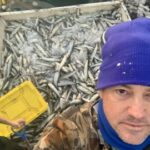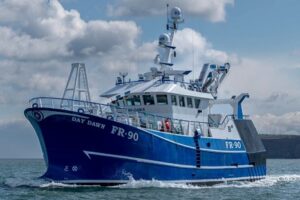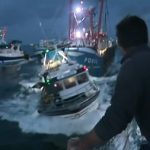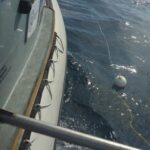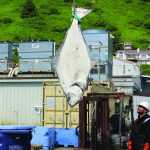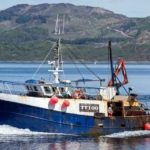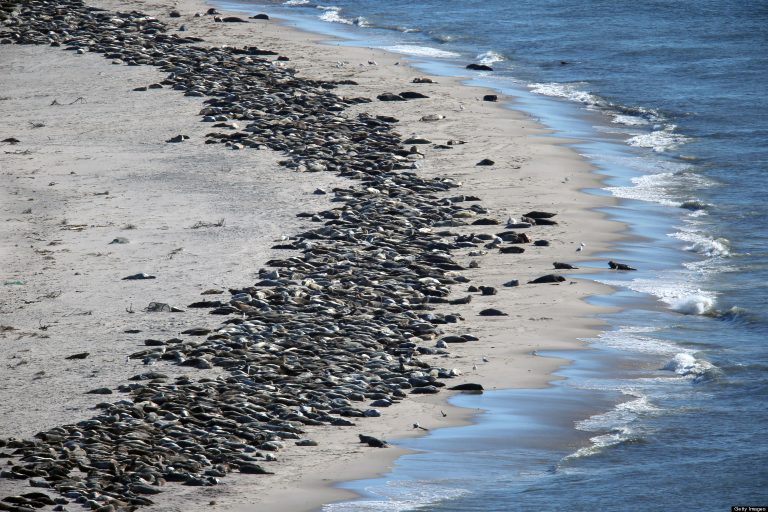Monthly Archives: October 2012
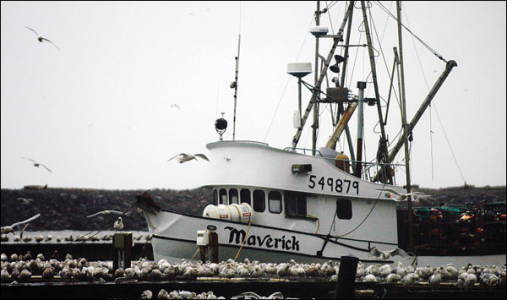
The sinking of the Maverick: A survivor’s account – Sequim Gazette
Following is Will Oosterga’s account of the incident, recorded on the evening of the wreck at the home he shares with Dennis Bender in the upper village at La Push.
Some time early this morning I woke up you know to go to the bathroom. There was a light outside the boat. I woke the captain up and told him you know I thought it was the Coast Guard out there checking on us. Maybe want to do a safety boarding or something. From the time I that I had seen the light turned away to wake him up the lights and looked back out the lights had gotten a little closer. And you know…trying to figure out if they’re coming at us or not. And all of a sudden I didn’t see the light anymore…Read More http://www.sequimgazette.com/news/article.exm/2012-10-03_the_sinking_of_the_maverick__a_survivor_s_account
Crisis highlights running dispute over US fish law
Jay Lindsey once again tells us a portion of the story, and shame on Peter Baker for capitalizing on it, as is the usual for Peter Baker!
But Peter Baker of the Pew Environment Group said the law is not to blame for fish populations that have dwindled over decades, exactly what the law can fix. The law is pointed in the right direction, he said.
Have the stocks dwindled Peter Baker? And what would you base that assumption upon? The reliable trawl data of the NESC? You have the information that everyone else has that pays attention to these issue. Of course, you wouldn’t recognize the weaknesses when they conveniently favor your ENGO crusade. If there actually is plausibility to the data, and I say that with doubt, would you also recognize that herring would be included as a predator, along with an exploding population of seals, dogfish and skates, hindering any recovery? No you would not! I base that on your narrow-minded herring campaign which can’t seem to be capable of connecting any dots! Isn’t it convenient to say the 2008 trawl data was flawed, while the revelations of the NESC that they are not using the industry designed equipment for the trawl survey as was specified during the creation of it?
I am disappointed with another Jay Lindsey half story again, and am disgusted with the Pew network.
httphttp://www.berkshireeagle.com/northeastnews/ci_21717557/crisis-highlights-fish-law-dispute
Pinellas fisherman dies a month after attack on boat
MADEIRA BEACH — A commercial fisherman who was found severely beaten last month has died, authorities said. As a result, authorities are reviewing charges already brought against three homeless men accused of attacking Michael T. Merrill at about 2 a.m. on Sept. 12. Merrill encountered the men aboard the Lilly Anne, a 33-foot commercial fishing boat docked at a marina just south of the Tom Stuart Causeway. According to the Pinellas County Sheriff’s Office, the three transients, identified as Timothy John Schuyler, 31; Joshua Eugene Shroyer, 38; and Kord Lynn Tucker, 39, confronted Merrill on the boat late the night before.http://www.tampabay.com/news/publicsafety/crime/article1255024.ece
MENHADEN DEFENDERS: Mini (the dolphin) Needs Menhaden – savingseafood.orgs excellent analysis rebutts. (Mini won’t be going hungry!)
Our grassroots group, “Menhaden Defenders” has been working with fellow anglers to increase awareness and get fisherman involved in the fight because they are on the front lines and have watched this vital
forage fish vanish right before their eyes. After sitting before the Atlantic States Marine Fishery Commission (ASMFC) last week, it frustrated me to listen to our publicly appointed commissioners openly debate
whether or n……
Analysis: Menhaden Defenders’ Paul Eidman, in his article, “Mini Needs Menhaden,” writes of “an ecological disaster in the making” unless new limits are imposed on the Atlantic menhaden fishery.
This is just one of several exaggerated claims about the current state of menhaden management in the article, which fails to present several key facts in its account……Read More.
New Regionl NMFS fisheries leader hosted ‘listening session’ in Chatham Oct.2, 2012 – Hey Andy, herring eat too, ya know!
CHATHAM — At the town’s community center Thursday night, there was little animosity on display, as is often the case when fishermen square off in a room with an official from the National Marine Fisheries Service, the federal agency charged with overseeing the commercial fishery. Perhaps that was because of John Bullard, the newly minted fisheries service Northeast regional administrator, and his gentle manner as he listened to what Cape fishermen had to say about fisheries management. “You’re an even-tempered, soft-spoken man. You got that thing going on,” mused Provincetown fisherman Beau Gribbon………….Andy Baler, owner of the Nantucket Fish Company, said fishery managers needed to protect forage species such as herring that formed the basis of the marine food chain. “Herring feed everything,” he said. Baler advocated managing stocks not as single species but by placing importance on the relationships between species.
Andy Baylor has drunk the Pew Brew. He is blind to the FACT herring are now a predator specie, feeding voratiously on codling. http://www.capecodonline.com/apps/pbcs.dll/article?AID=/20121005/NEWS/210050330/-1/NEWS11
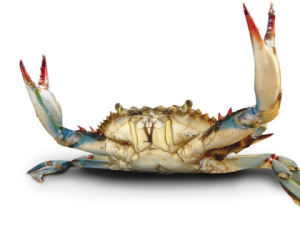
VIMS cracks the case of blue crab parasite
Marine researchers have spent 15 years trying to nail down the life cycle of a single-celled parasite fatal to blue crabs. On Thursday, they announced they cracked the case. “Describing the entire life cycle of the Hematodinium was an important breakthrough for us,” said Jeff Shields at the Virginia Institute of Marine Science (VIMS) in Gloucester Point. “Having all stages in culture means we can now really start picking the life cycle apart to learn what the organism does and how it functions.” Armed with this new knowledge, researchers hope to stem infections that are a growing concern to wild fisheries and aquaculture operations. The parasite is harmless to people
http://www.wdbj7.com/news/virginia/dp-nws-blue-crab-parasite-20121005,0,394412.story
Despite Tumult, NOAA’s Lubchenco Would Like 4 More Years
It’s been a tumultuous few years for marine biologist Jane Lubchenco, the head of the U.S. National Oceanic and Atmospheric Administration (NOAA). She’s confronted an unprecedented and politically sensitive![environmental-watchdog[1]](https://fisherynation.com/wp-content/uploads/2012/09/environmental-watchdog11-150x143.jpg)
oil spill in the Gulf of Mexico, struggled to keep expensive satellite programs on track, and butted heads with Congress, which sank her efforts to reorganize NOAA’s climate science programs and appoint the agency’s first chief scientist in nearly 2 decades. Still, Lubchenco says she’d like to keep her job if President Barack Obama is reelected in November.
http://news.sciencemag.org/scienceinsider/2012/10/despite-tumult-noaas-lubchenco-w.html?ref=hp
Maine Voices: Diversity, versatility important to future health of fisheries
By PATRICK SHEPARD
In light of the recent disaster declaration for the New England groundfishery, fishermen and managers need to begin planning for the future of this important industry to ensure that affordable opportunities exist for young fishermen as groundfish stocks rebuild. Let’s fast-forward, for a moment, to when populations of cod and haddock are commercially abundant off Maine’s coast once again. What will this mean for local fishermen? The shocking, short answer is that most Maine fishermen won’t have the rights to be able to catch those fish. While there’s been a lot written about the high abundance and low price of lobsters this year, one thing that hasn’t been discussed is that most of the fishermen in this state don’t have the federal permits required to catch anything other than lobster.http://www.pressherald.com/opinion/diversity-versatility-important-to-future-health-of-fisheries_2012-10-05.html
CALIFORNIA: ACSF Opposes Sanctuary Expansion of Monterey Bay National Marine Sanctuary
October 5, 2012 — The Alliance of Communities for Sustainable Fisheries (ACSF), formed in 2000 to represent the commercial and recreational fishing interests of the six harbor communities in the central coast of California, released a statement opposing the expansion of the Monterey Bay Marine Sanctuary. The ACSF represents an area that includes the current sanctuary. The ACSF’s letter of opposition explains why regional fishermen oppose expansion of the Sanctuary and believe that it should instead focus on improving its governance and community relations.
Read a PDF of the letter here http://www.savingseafood.org/images/acsfletterresfexpansion.pdf
Anglers debate OC offshore wind farm – Dredging and fishing near turbines could (will)be prohibited
ANNAPOLIS — If a wind farm is ever built off the coast of Ocean City, it could enhance recreational fishing by creating artificial reefs, but hurt commercial fishermen who dredge in the area by taking up valuable bottom with cables and lines. A number of steps still need to be taken before the offshore farm, which could include between 50 and 100 wind turbines, becomes a reality. Still, Catherine McCall of the Maryland Department of Natural Resources said the department is taking steps now to minimize the impact on the fishing community. “The largest impact could occur to gear types that tend to make contact with the bottom, so your trolls or your dredges. The connections between each of the turbines require cables or lines and you don’t want people dredging or trolling over that,” McCall said. McCall said where dredging would be prohibited would be decided during the siting process. Depending on who installs the project, all fishing near the turbines could be prohibited for safety reasons. Gov. Martin O’Malley’s Maryland Offshore Wind Energy Act of 2012 passed through the House of Delegates but never came to a vote in the Senate. The bill is not necessary to build a farm but would encourage construction by requiring that Maryland power suppliers get a certain amount of power from wind. Similar legislation is expected in 2013 as proponents continue to try to jump start wind farming in Maryland.
http://www.delmarvanow.com/article/20121005/WCT01/310050009/Anglers-debate-OC-offshore-wind-farm
“our efforts to redesign fisheries”
This article should be renamed to “How a TED grant helped spread a job killing scam”
Some of the lowlites:
– Overfishing is the number-one threat to the oceans’ ability to provide food and sustain life.
– EDF’s Oceans Program has turned this investment into what we now call the “Big Bet,” a campaign to convert the majority of US, Canadian and Latin American fisheries to catch shares.
– It is critical that the world’s movers and shakers gain a working knowledge of our efforts to redesign fisheries.
+ Economics: 80% revenue increases per boat due to better yields and dockside prices.
And the results are coming in. This radical scam is ruining the commercial fishing industry, where ever it is deployed. It’s easy to increase the revenue per boat. Fleet reduction!
Louisiana seeking temporary exemption from TEDs – Shrimpers are fighting the impact of debris left by Hurricane Isaac
In two letters sent to Dr Jane Lubchenco, undersecretary of commerce for oceans and atmosphere and administrator of NOAA, the Washington delegation is asking her for a “temporary exemption from 
federal TED requirements for inland and offshore shrimp trawlers.” The letters were signed by members including Senators Mary Landrieu and David Vitter, as well as House Members Cedric Richmond,
Jeff Landry and John Fleming, MD.,,,,,,,,“This impact will last approximately three months until the winter storms can help dissipate the debris,” said Gerica. “Right now, shrimpers cannot work at all. They’ve been dropping test nets which have been coming up completely full of debris.” Remarkably, openings in the TEDs are getting jammed so quickly that bycatch are unable to escape
Meet John Kassel CLF President / Cape Wind Shill / Advocate of Ocean Destruction, and a crappy blogger, too.
What could be said about Cape Wind?! That depends on your own point of view. Some opinions are based on rhetorical ideology.
Others?
Cold hard facts.
If you are the President of Conservation Law Foundation, rhetorical notions are sufficient.
So much so, that Offshore Wind Advocate John Kassel President, CLF, has been on a advocacy campaign of ocean destruction to decimate what he claims to love.
These values are often associated with places: when we think of America, we think of the icons of America. Yellowstone. Zion. And New England’s very own Acadia National Park. As Americans, preserving these natural treasures is among our proudest accomplishments. Our oceans should be no different. Here, in the Gulf of Maine, we have George’s Bank, Stellwagen Bank, and Cashes Ledge – a spectacular undersea mountain range – where you find steep canyons, deep kelp forests, and vibrant, charismatic marine life. Their beauty and majesty are breathtaking.
The places he describes are the very places we harvest our seafood from. Natures infinite food producing ocean bottom.
All Natural. No Preservatives. With care, a never ending, virtually endless supply of fish and shell fish.
Gulf of Alaska – Time to get a handle on bycatch numbers – By Dave Kubiak – peninsulaclarion.com
For years fishery managers and those concerned about bycatch have been plagued by a lack of real numbers on how many king salmon, crab and halibut are being discarded in some of the dirtiest fisheries in the Gulf of Alaska. In the struggle to reduce bycatch of these critical species, we haven’t even had an accurate body count.  After prolonged frustration with the current system, a solution appeared to be on the horizon when the North Pacific Fishery Management Council (the Council) took action to restructure the observer program two years ago. At their meeting in Anchorage next week, the Council will review plans for implementation of
After prolonged frustration with the current system, a solution appeared to be on the horizon when the North Pacific Fishery Management Council (the Council) took action to restructure the observer program two years ago. At their meeting in Anchorage next week, the Council will review plans for implementation of
http://peninsulaclarion.com/opinion/2012-10-03/time-to-get-a-handle-on-bycatch-numbers
Scallop fishermen speak out on proposed zoning rules in Ellsworth
ELLSWORTH, Maine — Members of Maine’s scallop industry gave mixed reviews Tuesday to proposed rules that would establish multiple fishing zones on Maine’s coast. The Department of Marine Resources held a public hearing at Ellsworth City Hall to solicit input from fishermen and other industry members on the new rules. It was part of a four-day swing through the state that began Monday in Machias and ends Oct. 4 in Wiscasset. About two-dozen people, mostly fishermen, showed up at Tuesday’s meeting. Many criticized a proposal to implement rotational management http://bangordailynews.com/2012/10/03/news/hancock/scallop-fishermen-speak-out-on-proposed-zoning-rules-in-ellsworth/
Editorial: Feds cannot allow altering of NOAA abuse report Gloucester Daily Times – Another Shameful Obama Administration Blunder
After sitting more than six months on a second, in-depth probe report from special investigator Robert B. Swartwood III, the word that Acting Commerce Secretary Roberta Blank has asked her staff “to gather more information regarding issues” spotlighted in Swartwood’s report on 66 cases of alleged abuse by NOAA enforcement personnel against the commercial fishing industry at least shows some long-overdue movement. Yet, it’s also troubling to learn that Blank expects to “use that information to finalize her decision memorandum,” as Blank’s press secretary, Marni Goldberg, reported in an email to the Times last week. While Blank may indeed be “completing her analysis” of the second Swartwood report,,,,,,,Read More
Scientists Still Eyeing the ‘Dead Zone’ By Terry Dillman. This article SCREAMS for collaborative research!
This article is a perfect indication of the benefits of industry involved collaborative research, while the history of R/V Henry B Bigelow demands cut backs to NOAA’s pathetic role of stock assessment.
Five Indicted on Charges of Embezzling Nearly $500,000 From Trident Seafoods Five people with ties to Kodiak, Alaska
CLF – Why We Need to Fight for Cape Wind. Now. The Koch Brothers! The Koch Brothers! It’s always the fracking Koch Brothers. Dry up, you Ninnys
11 years. That’s how long we’ve been waiting for the promise of Cape Wind: clean, renewable energy; new, green jobs; reduced air emissions and carbon pollution; energy at a predictable price over the long-term; and energy security. At a time when the evidence of global warming is overwhelming, and the need for jobs critical, unleashing the potential of this home-grown offshore wind project can only be a good thing.
bore head
Your comment is awaiting moderation.
This editorial is not accurate. This project is environmentally irresponsible. How any environmentalist can ignore the damage to the eco system that they crucify fishermen over, is obscene. To ignore the assult of the ocean bottom that will be supported with your short sighted position is revealing. 80% approve? Hogwash. This is an ocean destroying industrial complex.
Lets see if they post it.
Lobster council executive director abruptly resigns from Maine Lobster Promotion Council

PORTLAND, Maine — As Maine and its lobster industry work to revamp the way the state’s signature seafood is promoted, there has been an abrupt shakeup in who will lead that effort.
Dane Somers, executive director of the Maine Lobster Promotion Council, resigned his position Tuesday, according to a press release sent out by the council. Marianne LaCroix, the council’s director of marketing the past six years, takes over as acting director, effective immediately, according to the council’s chairwoman, Emily Lane. Lane is vice president of sales for Calendar Islands Maine Lobster Company.
http://bangordailynews.com/2012/10/02/business/lobster-council-executive-director-abruptly-resigns/
Final action scheduled for charter-commercial halibut split North Pacific Fishery Management Council
By MOLLY DISCHNER Morris News Service – Alaska
The North Pacific Fishery Management Council will consider several alternatives for Pacific halibut allocations at its October meeting.
The council meets today through Tuesday in Anchorage, and has scheduled two full days for halibut issues. The council is slated to take final action on the halibut catch sharing plan for Southeast, or Area 2C, and Southcentral, or Area 3A. The council is tasked with finding a way to split a combined catch limit, set by the International Pacific Halibut Commission, or IPHC, between commercial and charter fishermen.
Fierce Competition, Fish Piracy, Led to NW Fishing Industry Decline, Says New Book
McMINNVILLE, Ore. (PRWEB) October 03, 2012 The waters off the coast of Washington state and British Columbia were once filled with fish pirates and border bandits vying for salmon, according to a new book by Linfield CollegeProfessor Lissa Wadewitz The Nature of Borders: Salmon, Boundaries, and Bandits on the Salish Sea documents how fishing practices in the late 19th and early 20th centuries turned the boundary waters into a lawless Wild West. When the neighboring countries of the U.S. and Canada established their shared border, no one told the salmon. Driven by instinct, the iconic fish of the Pacific Northwest migrated straight across the border, drawn to historical spawning grounds. In the competition for salmon that ensued, Wadewitz says pirates smuggled fish http://news.yahoo.com/fierce-competition-fish-piracy-led-nw-fishing-industry-100200646.html
States Schedule Hearings on Atlantic Menhaden Draft Amendment 2 – The dates, times, locations, and analysis provided by savingseafood.org
The Draft Amendment presents a suite of options to manage and monitor the stock in both the short and long-term. These include options to end overfishing; change the biomass reference points to match the fishing mortality reference points; and establish,,,,,,,,,,read more
The Draft Amendment responds to the findings of both the 2010 benchmark stock assessment and the 2012 stock assessment update that indicate the stock is experiencing overfishing but may or may not be overfished depending on,,,,,Read more
Mid-Atlantic Fishery Management Council Public Listening Session: Clean Ocean Zone Initiative
October 2, 2012 — The Mid-Atlantic Fishery Management Council Meeting will be held Tuesday, October 16 from 5:00 pm to 6:00 pm,
and will be held at the Ocean Place, One Ocean Boulevard, Long Branch, NJ 07740.
Activist wins defamation case launched by salmon-farming company – Anti-salmon-farming activist Don Staniford has won
“Whether we won or lost, we did the right thing. People have to stand up to these people,” she said. “Somewhere down the road, accountability will be made.”
http://www.spjournal.com/article/GB/20120928/CP02/309289834/-1/stp/activist-wins-defamation-case-launched-by-salmon-farming-company&template=stpcpart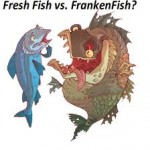
Fishing for truth in the feds’ latest Alaska halibut management plan – Craig Medred | Oct 01, 2012 Alaska Dispatch
With another round in Alaska’s halibut war shaping up between commercial fishermen and charter-boat operators, the staff of the National Marine Fisheries Service has written a 333-page indictment of what is wrong with management of the big flatfish in the North Pacific.
“The Regulatory Amendment for a Catch Sharing Plan For the Pacific Halibut Charter Sector and Commercial Setline Sector in International Pacific Halibut Commission Regulatory Area 2C and Area 3A” — as federal regulators call their hefty tome — was not intended as such as indictment, but that is what it ended up becoming. It is a long-winded, redundant, hard-to-fathom testament to what the agency didn’t do in terms of assessing economic impacts associated with changes in the halibut fishery, and what it plans to do to benefit commercial fishermen.
Where other U.S. resource agencies focus on generating revenue for the cash-strapped U.S. Treasury by making money off public resources — be it oil, gas, minerals, timber range land, or even scenery — the Fisheries Service is focused on increasing revenue for the fishermen with whom it long ago formed an alliance.
Syndicate Fish Wars: How the battle over halibut has impacted charters and commercial fishermen
Is the goal job elimination?
Show me the money
Charter operators growing tired
Damping down tensions
ENDORSEMENT: Toss gill-net ban overboard-Measure 81 seeks to benefit sport-fishing industry- The Register-Guard
With recreational sport-fishing advocates backing away from their initiative to ban gill nets, with Gov. John Kitzhaber asking the state Fish and Wildlife Commission to consider moving gill-netters off of the Columbia River’s main stem and into shallow side areas and with tribes that hold treaty fishing rights solidly in opposition, Oregon voters should cast a confident vote against Measure 81 in the Nov. 6 election.
The measure’s sponsors, a curious coalition of conservation groups, wealthy sport fishermen and businesses that cater to them, have inaccurately depicted the 200 commercial gill-netters who work the Columbia as indiscriminate killers of marine life who threaten endangered salmon runs. http://www.registerguard.com/web/opinion/28835455-47/gill-measure-ban-netters-columbia.html.csp
Gill nets that select hatchery fish over wild? Really? You expect anyone to believe that?
Sport fishermen contribute many millions more in tax revenues than the gill netters. Why is the Opiner Of The Day advocating for reducing tax revenues? Sport fishermen are able to individually select and release wild fish.
“Five Generations” of gill netting doesn’t justify the practice any more than hundreds of generations of whaling justified their slaughter.
Restaurants and processors can get fish from commercial hatcheries.
Thats five generations of fishermen harvesting the citizens resource for them. Not everyone is capable of catching their own fish, and depend on commercial fishermen to do that for them. Commercial Hatchery’s Pig Iron? No thanks. It’s junk.
Fatal boat collision in dense fog off Wash. coast – 40-foot fishing boat Maverick was drifting when it was hit and sunk by the 90-foot fishing boat Viking Storm,
SEATTLE —
The fog was very thick at 4:30 Friday morning 30 miles off the Washington coast where the 40-foot fishing boat Maverick was drifting when it was hit and sunk by the 90-foot fishing boat Viking Storm, the Coast Guard said.
Exactly how the collision happened is the subject of a Coast Guard investigation that will likely take months, but the Maverick went down quickly, and only three of the four people on board survived.
“It was very, very thick fog – visibility about 40-foot,” Lt. Cmdr. Matthew Denning, chief of marine investigation in Seattle, said Monday. “Visibility was certainly an issue.”
The bigger boat hit the smaller boat on the left side toward the front, Denning said.
The missing crewman, Kelly Dickerson, was in a room in the forward part of the ship and the Maverick sank bow first.
“He was trapped,” Denning said.
http://seattletimes.com/html/localnews/2019316586_apwafishingboatscollide5thldwritethru.html
Rhode Island Fishermens Alliance – Weekly Update.
Richard Fuka, President of the RI Fishermen’s Alliance, will moderate a discussion of the plight of RI Fishermen regarding the imposing of federal regulations on the fishing industry on Thursday, October 4 7:30 in the Metz Exhibit Hall at South County Museum. The program includes a viewing of the movie “Truth – Fishing Crisis or Government Mismanagement.”
http://hosted.vresp.com/1181479/990608a352/545569281/ad93d20bca/
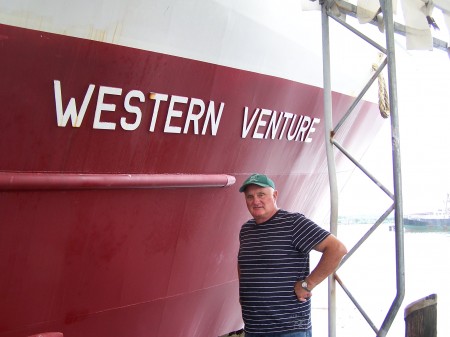
A Question that Demands a Better Response Than What Was Recieved. – The Free Press
This second writing for the Free Press finds me at a place that forces me to revisit my article for the First Edition.
things-are-lookin-pretty-good-for-the-predators-whats-a-poor-cod-fish-to-do-the-free-press
The New England Fishery Management Council began its three day meeting in Plymouth Ma on 9/25/2012.
As is typical of bureaucratic meetings, this one was spiked with some, at times, semi excitement, and threats.
The New England Fishery Management Council approved a motion to allow groundfishermen access to large areas off-limits to fishing.

































